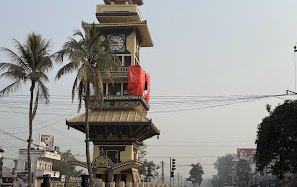
In collaboration with Oxfam in Nepal, SAWTEE organized a National Stakeholder's Dialogue on "Upcoming 18th SAARC Summit: Nepal's perspectives on climate change, agriculture, food security and disaster risk reduction" on 16 October.
The major objective of the dialogue was to identify and discuss issues important for Nepal in the area of climate change, agriculture, food security and disaster risk reduction. The dialogue was attended by sixty participants representing the government, civil society organizations, private sector, academia,and the media.
In the backdrop of the upcoming SAARC summit, Dr. Govinda Nepal, Member, National Planning Commission, talked about how SAARC has taken initiatives on issues of climate change, food security and disaster risk reduction. He also mentioned that these statements have mostly been "decorative". He stressed the need for the 18th SAARC Summit to convert these commitments into reality.
Nirmal Kafle, Joint Secretary, Ministry of Foreign Affairs, acknowledged the vulnerability of South Asia to climate change and stressed the need for collaborative efforts especially in terms of financial cooperation and knowledge sharing
At the opening session Noreen Khalid, Interim Country Director, Oxfam in Nepal, highlighted the need to move forward with good collaboration between civil society organizations and the government of Nepal on mitigating and adapting climate change and disasters.
Concluding the inaugural session, Dr Posh Raj Pandey, Executive Chairman, SAWTEE, stated that climate change is happening. He also mentioned that in the next few decades drastic decrease in crop yieldsshould be expected in the region.The poor are the most affected by climate change, which must be taken into account by all national and regional initiatives, including policy measures.
The first thematic session focused on climate change from domestic and regional perspectives with highlights on previous SAARC commitments. Chaired by Ajaya mani Dixit, Executive Director of Institute For Social and Environmental Transition (ISET), Dr. Smriti Dahal, senior program officer of SAWTEE presented the paper on Upcoming 18th SAARC summit: Nepal’s perspective. Dr. Madhav Karki and Arjan Dixit, regional climate change coordinator Asia, CARE International commented on the paper.
The next thematic session on food security dwelt on the severity of food insecurity in the context of Nepal. The third thematic session dealt with disaster risk reduction in Nepal focusing on implementation challenges for disaster management policies.
According to a press release issued by SAWTEE, Hiramani Ghimire, Executive Director, SAWTEE, concluded the dialogue by saying that the three components: climate change, agriculture/food security and disaster risk reduction are interrelated, so comprehensive efforts are needed to address the problem. He was of the view that prior commitments made in these areas should first be implemented rather than enlarging the list of new commitments. He saw this as an opportunity to be used in the upcoming SAARC Summit.
- MELAMCHI WATER SUPPLY: No Interruption During Monsoon
- Jun 25, 2025
- KOREAN RETURNEES: Successful Integration
- Jun 25, 2025
- UPPER TRISHULI-1: Engaging With Local
- Jun 25, 2025
- IME GROUP: Twenty Five Years Of Journey
- Jun 24, 2025
- NEPAL’S AIR POLLUTION: A Growing Health Concern
- Jun 24, 2025















